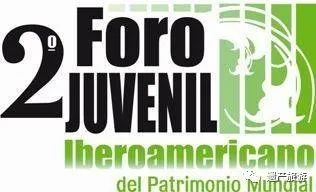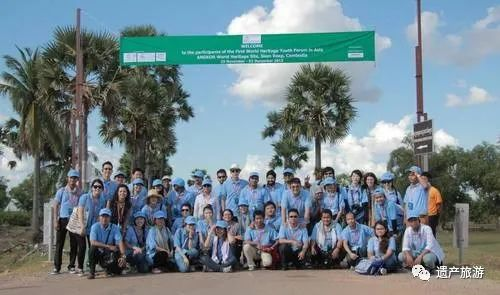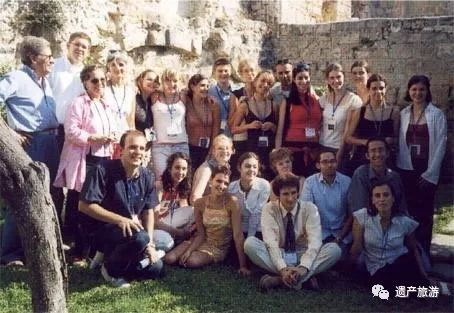Young People’s Views on Heritage and Tourism: Review of previous World Heritage Young Professionals Forum
2021-06-09 17:18:27
Reprint:Originator:Yang Xiaopeng, UNESCO Chair in Sustainable Tourism at UNESCO Designated Sites, Mar. 30, 2020
As one of UNESCO’s most successful projects for young people, The World Heritage Young Professionals Forum(WHYPF) is not only a platform to raise young people’s awareness of the world’s natural and cultural heritage protection, facilitate cultural exchanges and provide learning opportunities, but also a global stage to showcase the wisdom of youth, air their views and take on responsibility. In the previous forums, some exciting and wonderful ideas or views were presented in the joint declaration of the WHYPF, which had attracted significant attention in the session of the World Heritage Committee. Tourism, which is closely related to heritage, is one of the hottest topics at the WHYPF. This article focuses on the tourism topics discussed at previous forums to understand the views of youth on the relations between tourism and heritage.
Ⅰ.What did we talk about concerning tourism?
As early as 1995, at the first WHYPF held in Norway, young people recognized that tourism development has a two-sided effect; tourism’s positive impact should be maximized while simultaneously minimizing the negative consequences. The youth participants also articulated that “youth can play a significant role” in “cultural tourism”. Since then, tourism-related discussions have frequently appeared in the subsequent forums, focusing on two major themes: understanding the dualistic effects of tourism on world heritage and proposals on improving tourism management and regulating tourist behavior.
With the rapid development of heritage tourism, there are calls for attention on the impact of tourism on heritage. In the past decade, two WHYPF had chosen tourism as the forum theme.

Figure 1 The 2nd World Heritage Ibero-American Youth Forum
Source: whc.unesco.org/en/documents/116294
This forum theme was “cultural landscape and sustainable cultural tourism”. This particular forum had gathered young people between 12 and 15 from Brazil, Cuba, Mexico and other countries and guided them to understand their individual and social responsibilities in tourism and heritage protection through plenary sessions, visits to heritage sites, workshops, and debates.

Figure 2 The 1st World Heritage Young Professionals Forum in Asia
Source: whc.unesco.org/en/documents/139814
The theme of this forum is “monument management, community and tourism”. 38 young people between the ages of 20 and 30 visited Angkor, a world heritage site in Cambodia, conducted an in-depth discussion with experts on tourism-related topics, and held a simulation of the plenary session of the World Heritage Committee. In December of that year, the declaration of this youth forum was issued at the 25th special session of the International Coordination Committee for the Safeguarding of the Historic Site of Angkor (ICC-Angkor). The focus of the declaration is to “emphasize the responsibility of youth in the protection of world heritage and call on the youth of the world to devote themselves to the cause of heritage protection”, which aroused greater attention than before.

Figure 3 Delegates of the 1st World Heritage Young Professionals Forum in Asia (2015)
Source: http://whc.unesco.org/en/documents/137873
Ⅱ. What impact did tourism have on heritage?
In the previous WHYPF, young people had formed the following views on the impact of heritage on tourism:
Firstly, the participants believed that tourism positively affected heritage protection, with the economic benefits brought by tourism development fully affirmed. In the discussion of the first WHYPF for Africa (1996) held in Zimbabwe, it was mentioned that “heritage tourism is of great importance and plays a substantive role in the economy”. In the World Heritage Young Professionals Forum 2019 in Azerbaijan, it was also stated in the session that “heritage can be used as a tourism promotion label.”
Secondly, it is believed that tourism has a negative effect on heritage protection, with the damage to heritage caused by excessive tourism recognized. The first WHYPF for Africa (1996) emphasized that “tourism may erode the rights of local people, distort the diverse local culture, and even cause the destruction of natural and cultural heritage.” The 7th International Symposium of the Organization of World Heritage Cities (OWHC) (2003) in Greece pointed out that “heritage is not only dedicated to tourists but also to us, the young people” and called on us to be wary of ignoring heritage due to excessive tourism development.

Figure 4 WHYPF 2003 – 7th OWHC Symposium
Source: https://whc.unesco.org/en/documents/119174
Ⅲ. What suggestions do young people make regarding heritage tourism?
Based on data analysis of the previous youth forums, there are three aspects to the suggestions made by young people regarding heritage and tourism: strengthening protection, enhancing the spread of heritage values, and empowering communities.
In terms of strengthening heritage protection, the participants offered various suggestions, including monitoring and restricting the number of tourists visiting the heritage sites to prevent damages to the fragile heritage site; providing tourists with travel brochures, pictorials, and postcards and improving media promotion; focus more on the tourism infrastructure of the heritage sites such as increasing the number of trash bins and emphasizing the sanitary regulations of the heritage sites to keep the sites clean.
In terms of enhancing the spread of heritage values, young people’s suggestions included allowing selected teaching groups to enter the heritage sites for free or at preferential prices and providing them with relevant information about the sustainable development of the heritage sites; introducing local history and architectural culture to visitors; limiting the activities taking place in the sites to provide the tourists with an immersive experience and to prevent ‘over-tourism’; and assigning a tour guide to small groups of 10 to 12 tourists, among others.
In terms of empowering communities, young people emphasized that local people should pay attention to the cultural inheritance of heritage sites and prevent the distortion of heritage culture. On the one hand, cultural empowerment should be emphasized: government officials need to encourage people to pay attention to heritage and respect the value of heritage, and encourage the media to promote heritage culture through multiple channels. On the other hand, economic development should be prioritized: local businessmen could sponsor tours to heritage sites and museums, making it a priority to create jobs through tourism development for local people in underdeveloped areas, such as arranging job opportunities for them to become sanitation workers or security guards in scenic spots.
When you ascend Mount Tai and marvel at the majestic views on the peak of Mount Tai which “dwarfs all other mountains”, do they arouse within you profound thoughts about the future of heritage? When you set foot on Badaling Great Wall and feel the heroic spirits embodied in the old saying that “he who doesn't reach the Great Wall is not a true man”, do you have a deeper understanding of the responsibility of heritage protection? The WHYPF has always emphasized that “the future of heritage is in the hands of young people”. Indeed, as the driving force in the cause of world heritage, young people will eventually shoulder the responsibility of inheriting and developing our world heritage. Protecting and conserving heritage is always to remember the past of humankind, and heritage inheritance is a step toward a better future.
Young people are duty-bound to protect and inherit our world heritage.
References:
1. https://whc.unesco.org/en/youth-forum/
2. https://whc.unesco.org/en/activities/132/
3. https://whc.unesco.org/en/activities/129
4. https://whc.unesco.org/en/activities/133
5. https://whc.unesco.org/en/news/1417
6.https://www.khmerunity.org/2015/12/youth-declaration-on-1st-world-heritage.html